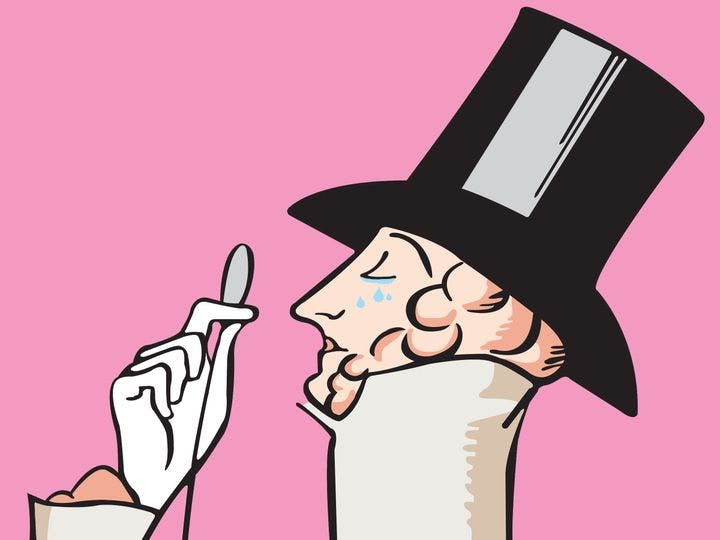Pity the Poor, Unloved Elite
– Adam Rosen
“Elite” is the laziest slur in the book. Yet, on both the left and right, “elites” — however we define them — are getting whupped.
Pat McCrory needed a breather.
Though he won the North Carolina governorship in November 2012 with a pledge of centrist moderation, in the less than two years he had been in office, a relentless stream of criticism had washed away the Republican’s bipartisan goodwill. His positions on teacher pay, unemployment benefits, voter ID laws, and abortion rights — to list but a handful of his trespasses — provoked tremors of outrage that radiated far beyond the Old North State’s borders. Six months into his term, no less than a New York Times editorial was mustered in protest, an unsigned op-ed with a declarative title: “The Decline of North Carolina.”
In July 2014, McCrory stumbled into a chance to strike back. The tenure of North Carolina’s poet laureate had expired the previous month. While the position is ceremonially appointed by the governor, the nitty-gritty of selection is traditionally left up to the North Carolina Arts Council, the state’s arts agency. A special committee organized by the Council does the heavy lifting, soliciting applicants, evaluating them, and making a recommendation — in effect, only bothering the governor for a rubber stamp. Presumably, the leader of the nation’s tenth most-populous state has more important things to do.
On a Friday afternoon, a time slot typically reserved for news dumps of information you don’t want the press to cover, McCrory’s office issued a press release introducing the state’s new poet laureate: Valerie Macon, a state employee with the Department of Health and Human Services and the author of two works of poetry, both self-published.
Established North Carolina poets were livid. A Durham-based literary magazine publisher told the Charlotte Observer that the selection “was an act of utter arrogance,” and a former laureate complained to the Raleigh News & Observer that the governor “just didn’t give a damn.” This may not be an unfair assessment. Emails released in October revealed that McCrory's staff had requested information about selection protocol two days before Macon's appointment, but declined to act on it.
The governor may not have predicted the strong reaction to his announcement — the selection process for a poet laureate isn’t exactly known as a political “third rail” — but he seemed to relish a newfound opportunity to answer his critics. The seven poets who had served since the position was created in 1948 may have been distinguished, Gov. McCrory conceded, but this time, the door would be open to “people that aren’t always a part of the standard or even elite groups that have been in place for a long time."
This pivot to populism wasn’t an accident. In doing so, McCrory deployed the oldest tactic in the book of political warfare: elite bashing.
Pity the poor, unloved elite. Everywhere you turn, they’re getting whupped. Nary a day goes by that you don’t hear about their evil plans to bring ruination to our once-great nation. It’s hard to think of any other group as routinely and unquestioningly pilloried by commentators across the political spectrum, with the possible exceptions of ISIS and the Kardashian family.
Pity the poor, unloved elite. Everywhere you turn, they’re getting whupped.
Talk radio tirades against culture-making Hollywood mandarins and the New York Times-reading Prius drivers who worship them are a cliché by now — ditto attacks against the “liberal media” — but elite-pummeling isn’t restricted to pundits on the right. In books and blogs and TV, elites are being disdained and disowned by talking heads on the left, too.
Count MSNBC host Chris Hayes’s 2012 book, Twilight of the Elites, among a bountiful supply of examples. Stories on reliably liberal online outlets like Salon and Alternet regularly boast titles like “How Inbred Elites Are Tearing America Apart,” “Elites’ Strange Plot to Take over the World,” and “Bush Is the King of All Elite, Effete Snobs.”
The elites, we are to believe, are everywhere, lurking in the shadows as they plot society’s ruination. “Powerful and greedy elites,” warns The Huffington Post, will “scapegoat the schools.” In Jacobin, the feisty socialist magazine upstart, one recent (and representative) essay lamented “the near-total capture of the political system by elites.” Another HuffPo title reminds us that no one is safe from their clutches, not even little league and AYSO teams: “Youth Sports: For Everyone, or Elites?”
Peak elite-hate may have actually been reached in July 2014, when The New Republic published William Deresiewicz’s cover-story essay blasting the Ivy League. In the article — one of the most-shared pieces in TNR’s history — the former Yale instructor bemoaned that the Ivies are “exacerbating inequality, retarding social mobility, perpetuating privilege, and creating an elite that is isolated from the society that it’s supposed to lead.” The following month, Deresiewicz released a book. Its title? Excellent Sheep: The Miseducation of the American Elite and The Way to a Meaningful Life.
All of this handwringing raises an obvious question: what actually makes an “elite”?
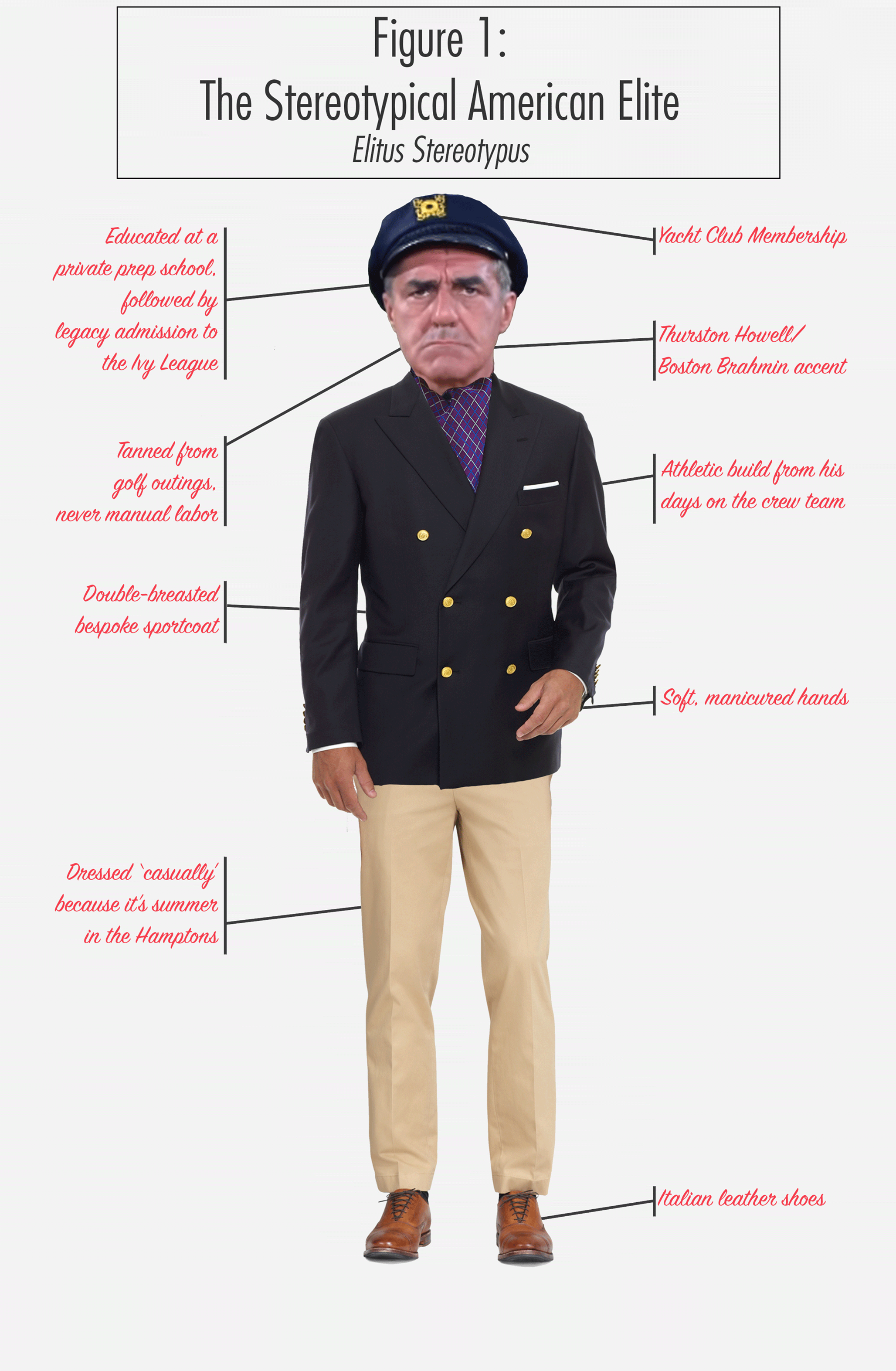
One place to start, perhaps, is the reliable stereotype from American popular culture: a WASP, probably of old-line stock, probably from America’s northeast, resplendent in topsiders and blue blazers, with second homes on Martha's Vineyard or the Hamptons, perhaps speaking in a Boston Brahmin accent. Think of Thurston Howell III, or the characters in books like A Separate Peace.
This milieu is the setting of Columbia sociologist Shamus Khan’s 2012 book, Privilege: The Making of an Adolescent Elite at St. Paul’s School, an ethnography of the prestigious New Hampshire boarding school. The “elitist” tropes aren’t entirely true: Khan, himself an alumnus of Pakistani and Irish heritage, observes that St. Paul’s has been drifting toward meritocracy, resulting in “an intentional diversity that few communities share or can afford.” Still, while the school may be shedding some of its aristocratic traits, its role as proving ground for the future wealthy and high-achieving seems to remain in force. Within this context, "elite" seems to be objectively descriptive. It’s not a slur.
In foreign affairs, the traditional definition of “elite” has been more straightforward. With so many countries in the grip of dictatorship, oligarchy, or kleptocracy, elites have been easy to identify: they’re the ones with money to spend and, frequently, immunity from the law.
But to define an “elite” in the United States is a slipperier business. An American journalist may not have much in terms of pay or wealth, but their influence on public policy, culture, and discourse is probably bigger than, say, the wealthy owner of a Dallas car dealership. Who is an elite? The journalist? The car dealer? Both? Neither?
The answer depends on how we delineate classes in American life. An “elite” in the eyes of a liberal is not necessarily the same thing as an “elite” in the eyes of a conservative. On the left, “elite” status is largely presented as an outgrowth of economic status (oftentimes inherited or earned on the backs of others’ work). On the right, elitism is often portrayed as less an outgrowth of economic wealth than one of cultural choice, a marker that differentiates the “in” crowd from red meat, “Duck Dynasty” America.
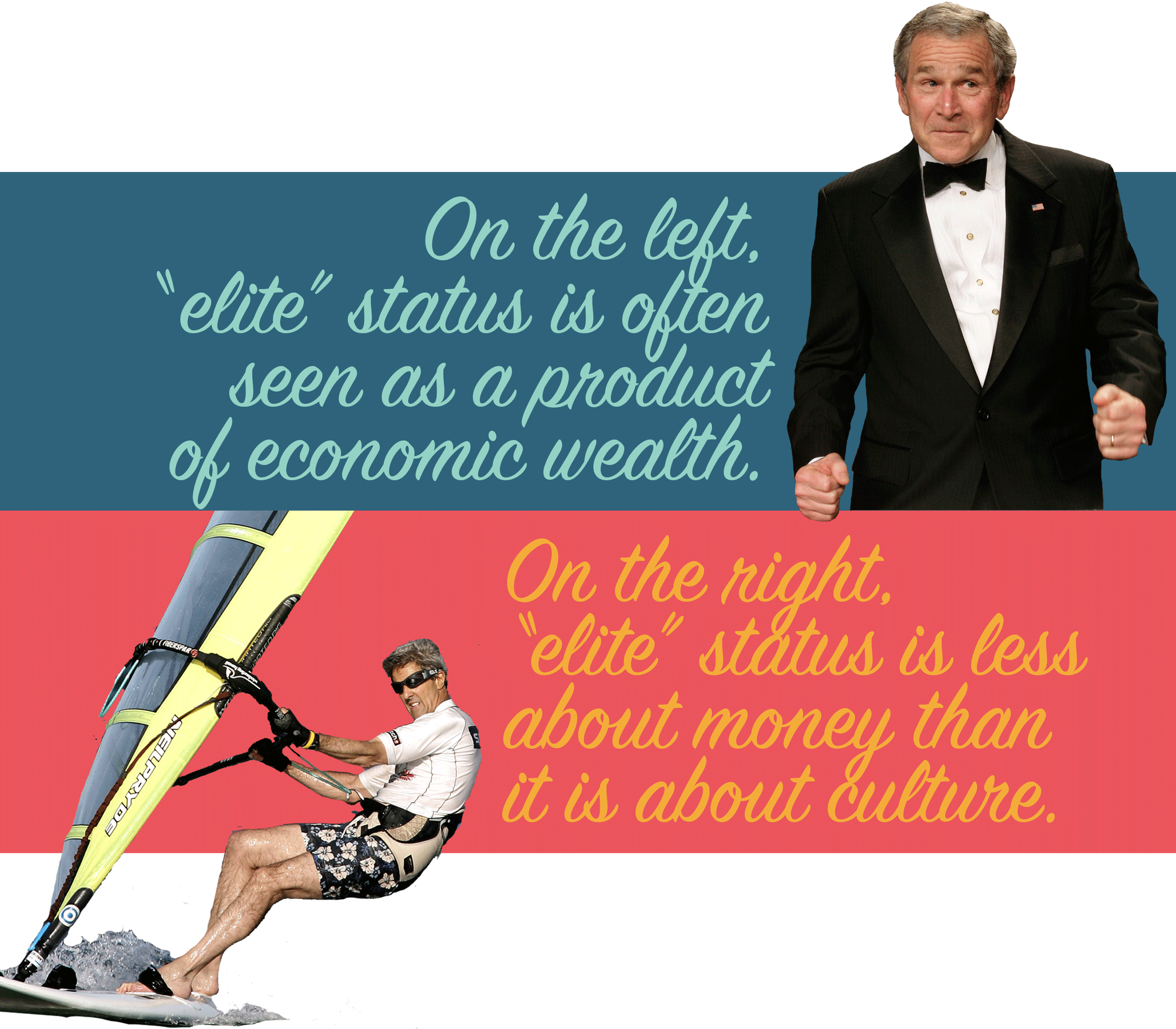
In this way, we can understand how, in 2004, George Walker Bush — millionaire scion of a political dynasty — was beloved by conservatives as folksy and authentic, while John Forbes Kerry, similarly privileged as his Republican rival, was seen as an out-of-touch “elite” prone to haughty gaffes (as in Maureen Dowd’s famous misquote of Kerry trying to win over fans of stock car racing: “Who among us doesn’t like NASCAR?”).
No one argued this point more forcefully than Joe Bageant, author of the political cult classic Deer Hunting with Jesus: Dispatches from America’s Class War. Bageant, a self-professed “leftneck” (i.e. a leftist redneck) spent the last years of his life trying to explain to the liberal clerisy — in vain — why so many working-class white people ostensibly “vote against their best interests,” to use the parlance common in circles that insist, rather presumptuously, that they instead know what is in the best interest of said people. This utter social disconnect, Bageant argued, explains the alienation of so many working class whites from a Democratic Party they would seem to naturally embrace. Bageant can’t really blame them:
Yet the liberal elite — and verily they are an elite group — don’t think of themselves as elitist. Overwhelmingly white and college educated, they live among clones of themselves. As far as they know, American life is about money, education, homeownership, and professionally useful friends. …
Most of the time the true middle and upper classes are scarcely aware that real working people exist. To wit: It is one helluva comment on the American class system when I can get paid to write and speak publicly about the 45 million or so working Americans who are all around us, citizens of this nation who have been fixing America’s cars and paving its streets and waiting on its tables. As a perfectly decent liberal New York City editor told me: “It is as if your people were some sort of exotic, as if you were from Yemen or something.”
The historian Christopher Lasch made a similar case in his 1994 book titled — what else? — The Revolt of the Elites. He was especially mad at the academy. “[Members of the academic left] speak, with irritating complacency, as members of a professional establishment that has given up the attempt to communicate with a broader audience, either as teachers or as writers,” Lasch wrote. “They defend their incomprehensible jargon as the language of ‘subversion,’ plain speech having been dismissed as an instrument of oppression.” Even Noam Chomsky, living demigod of the left, has railed against what he sees as the irrelevance of many intellectual class enthusiasms, in particular deconstruction and postmodern theory.
Not that the right takes any less advantage of the cheap spoils afforded by elite resentment. After all, they gave the world such colorful descriptors as “latte-drinking liberals,” “coastal elites,” and “limousine liberals,” among other chuckle-worthy epithets. A 2004 ad by the conservative “Club for Growth” reeled off these slurs as if calling numbers at some sort of liberal-stereotype bingo: “I think Howard Dean should take his tax-hiking, government-expanding, latte-drinking, sushi-eating, Volvo-driving, New York Times-reading, body-piercing, Hollywood-loving, left-wing freak show back to Vermont, where it belongs.”
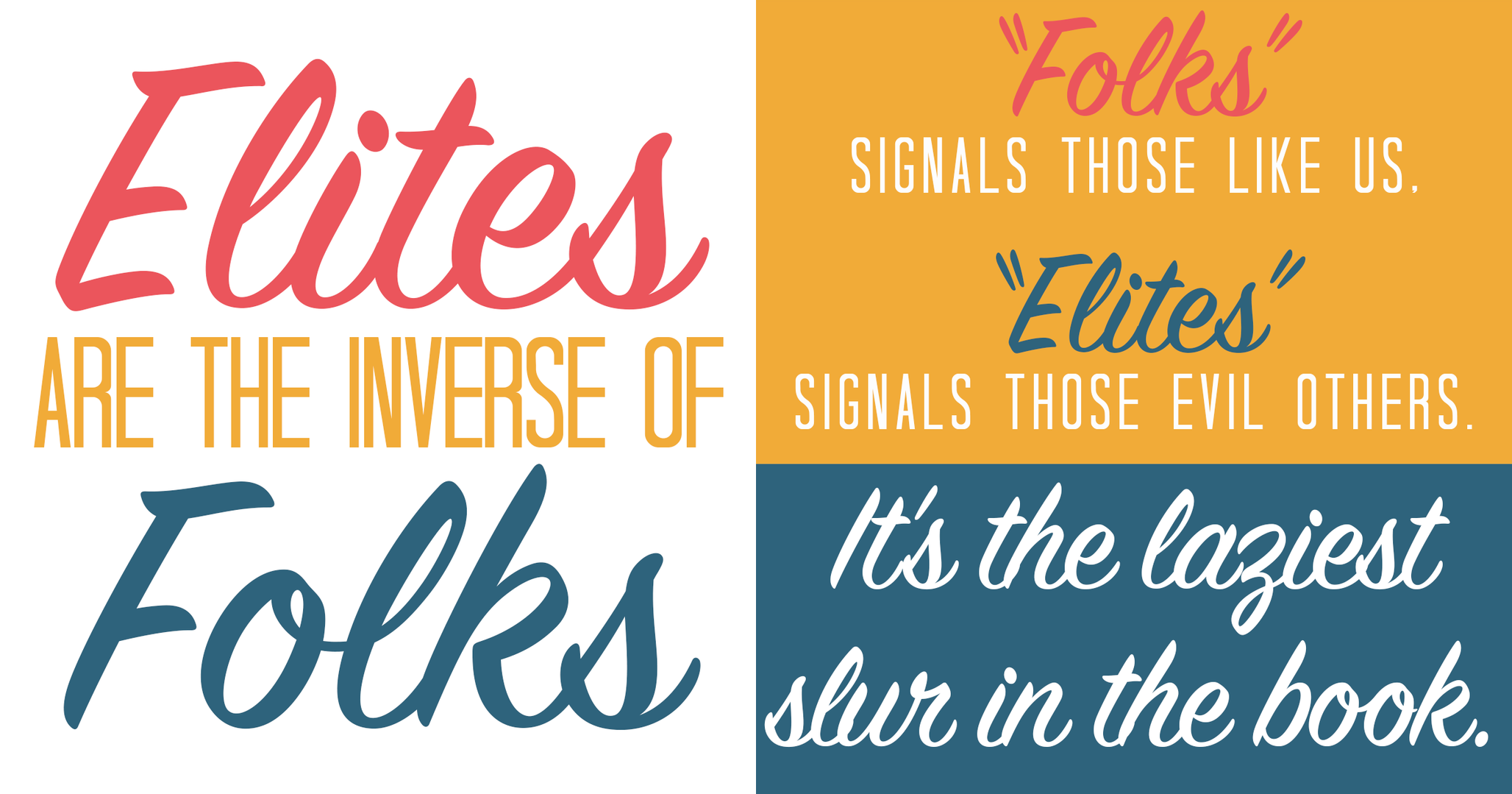
In 2003, Bernard Goldberg, the former CBS newsman-turned-mainstream media critic, wrote a book called Arrogance: Rescuing America from the Media Elite. In the years since, unironic use of the term “media elite” has become something of a shibboleth for the right. In his bestselling screed Pinheads and Patriots, Fox News host Bill O’Reilly claimed that “the elite snobs who dominate the mainstream media” made targets of the Tea Party as soon as they saw the conservative protesters wore “sweatshirts and baseball caps.” A few years earlier, in his book Who’s Looking Out For You?, O’Reilly wrote that “the elite media think the degeneration of American popular culture is beneath them and not very important.” Similar notes peal forth from his Fox News colleague Sean Hannity, who in 2005 declared that “within the rule book of the intellectual elite, no one who believes in God is to be taken seriously.”
In a 2012 National Review article titled “Obama’s Coddled Elites,” Michael Knox Beran grumbled about Mitt Romney’s pummeling in eight of the country’s 10 wealthiest counties. “It was just possible, before the election, to imagine that the broken economy would incite the white-collar coastal squirearchy to put down the glass of Merlot and join forces with toothless Appalachia itself to restore fiscal sanity in Washington,” Beran writes, implying both that he’s not part of the elite and that he — a scholar at the Manhattan Institute, contributor to The New Yorker, and graduate of Columbia, Cambridge, and Yale Law School — wouldn’t dare drink something as pedestrian as Merlot (perhaps, as I do, he prefers Pinot Noir). The title of his 2010 book? Pathology of the Elites.
Elite-bashing carries marketing currency. In March 2014, Fox News late-night host Greg Gutfeld published a book, Not Cool: The Hipster Elite and Their War on You. The work attempts to update the timeless accusations made by the likes of Goldberg and National Review staffers and graft them on to our age’s other cultural boogeyman, the hipster. “Being hip not only excuses the heinous — being heinous makes you hip,” writes Gutfeld, stretching to blame a preference for indie films and artisanal chocolate for the teen-idol treatment supposedly given to Boston Marathon bomber Dzhokhar Tsarnaev. (To be fair, knocking both elites and hipsters probably is a sound formula for book sales.)
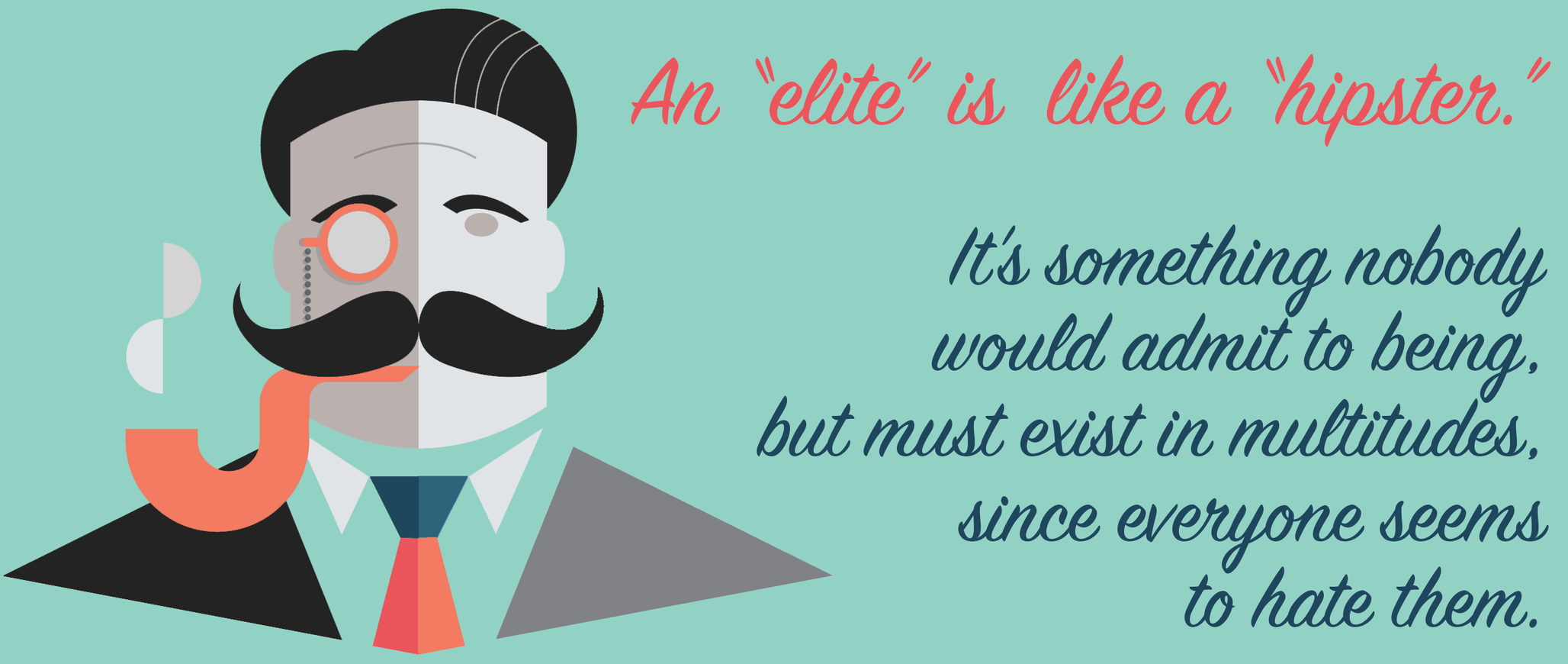
None of this even touches on politicians’ inexhaustible reliance on the elite card. In one recent noteworthy example, in 2014, the online biography of Virginia congressional candidate Dave Brat, the Tea Party-backed insurgent who defeated sitting House Republican Leader Eric Cantor, boasted that Brat “tested his rural values against the intellectual elite while at Princeton.” Never mind that he attended Princeton Theological Seminary, not Princeton University, or that during his campaign, Brat was a sitting professor of economics and former department chair at Randolph-Macon College.
The self-styled anti-elites, left and right, are a mixed bag. Some enjoy their own personality-driven TV shows, churn out books that top bestseller lists, or author cover stories in national magazines. Some are millionaires many times over. Some attended prestigious universities: Harvard (O’Reilly), Brown (Hayes), NYU (Hannity), Rutgers (Goldberg), Columbia (Lasch). Average they are not.
Whether they admit it or not, each conspicuous elite-basher comes from a privileged position. Even Bageant — who, after serving in Vietnam, attended college and carved out a firmly middle-class life for himself — acknowledged the advantages he had over the family and friends whose lives were the stuff of his writings. In a candid assessment, notable elite David Brooks wrote in the New York Times in 2012 that “the problem is that today’s meritocratic elites cannot admit to themselves that they are elites.” Indeed, theirs is the posture of some bizarro-world Eugene Debs: “While there is an elite class, I am not in it.”
With apologies to Gutfeld, I propose that “elite” is a cultural equivalent of “hipster” — it’s something no one would admit to being, but surely exists in multitudes, since everyone seems to hate them. “Elites” are the inverse of “folks.” Both terms are used as coded messages to in-groups: the latter to signal those like us, the former to signal those evil others. Both are also vague and ultimately meaningless — rhetorical flourishes meant to paint the speaker as righteous — and reside in the same ballpark of banalities as “community,” perhaps the world’s next most self-aggrandizing term. “Elite” is the laziest slur in the book.
Who suffers from these internecine battles between the elite-disavowing class? Non-elites: anyone whose supposed interests are invoked as cover for whatever the loudest anti-elitist intends to do.
Soon after Deresiewicz’s New Republic cover story, New York Magazine writer Maureen O’Connor pounced, calling the former Harvard student and professional man of letters out for his public self-flagellation. Deresiewicz’s position was not really new, but he was a recent and easy to deconstruct example of the elitist’s dilemma. In O’Connor’s article, “The New Privilege: Denouncing Your Privilege,” she wrote that “the elitists have developed a neat trick for reveling in their privilege while seemingly waving it off: elite populism, the practice of critiquing the privileged class to which you belong.”
Governor McCrory’s trick was especially cheap. Established poets, even if they are at the top of their field, are hardly basking in riches or celebrity-status perks. Given the dim commercial prospects of poetry, it’s a stretch to suggest poets are on par with CEOs, cable news talking heads, and the finite number of people with real influence or money — those who could objectively be judged as elites.
The only person to come out of McCrory’s debacle looking good was Macon, the would-be poet laureate. While justified in their anger, some of the more high-profile members of the state’s literary community seemed to prove the governor right, all but calling the self-published poet a hobbyist and a hack. The governor’s defenders launched into a predictable response of feigned outrage; several, at least, had the creativity to call the offended poets “snobs.” Less than a week after her appointment, the 64-year-old Macon resigned as the state’s eighth official poet laureate. In her resignation letter, she explained that she didn’t want the controversy to detract from the role of the poet laureate. “I remain passionate about the mission of poetry to touch all people regardless of age, education, or social status,” Macon wrote. “They do not need a list of prestigious publishing credits or a collection of accolades … just the joy of words and appreciation of self-expression.” Valerie Macon may not be elite, but she's certainly thoughtful.
Who suffers from these internecine battles between the elite-disavowing class? Well, non-elites — that is, the working and middle classes, black and white, whose supposed interests are invoked as cover for whatever the loudest anti-elitist intends to do. The assumption being that they should yield to their righteous guardians, elite-basher be thy name.
It all seems rather — for lack of a better word — elitist.
* * *
Adam Rosen works in academic publishing in Asheville, North Carolina. Find him at adammrosen.com or on Twitter at @adammmmmrosen.
